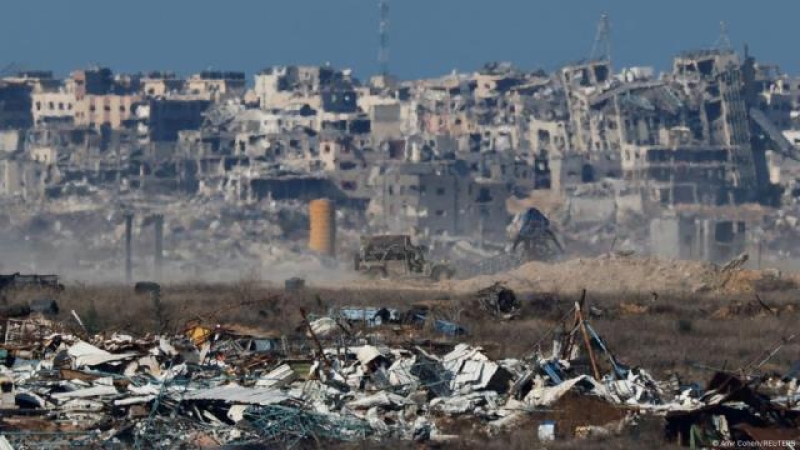- Zaima Rahman calls for common platform to build inclusive BD |
- Uprising’s expectations failed to be met in last 18 months: TIB |
- World Bank to Provide $150.75m for Bangladesh RAISE Project |
- Press Secretary Alleges Indian Media, AL Spread Disinformation |
- Hasina Gets 10 Years in Purbachal Plot Corruption Cases |
Gaza ceasefire: Gazans hope to return to their ruined homes
Netanyahu vows to return to war if necessary

Displaced Palestinians want to return home, but few know what remains of their homes after 15 months of warImage- Amir Cohen-REUTERS
Israeli Prime Minister Benjamin Netanyahu said he sees a new ceasefire as temporary and vowed to strike Hamas if the group does not abide by the terms of the ceasefire agreement.
• Israeli PM Benjamin Netanyahu warned the ceasefire is temporary and Israel retains the right to continue fighting if necessary with the backing of the US
• Israel's full Cabinet ratified the ceasefire deal last evening after it was approved by the smaller security cabinet, meaning the deal is set to take effect on Sunday
• Under the first phase of the deal, 33 hostages held by Hamas are to be released over the next six weeks, in exchange for nearly 2,000 Palestinians imprisoned by Israel
• The deal is also set to bring a pause to fighting between Israel and Hamas in Gaza, a conflict that has killed more than 46,000 people in the enclave, according to the health authorities in the Hamas-run territory
As the ceasefire approaches, hundreds of thousands of Gazans hope to return to what remains of their homes.
Hanaa Dabban, a nurse who was displaced from the Jabalia refugee camp, said the first thing she wanted to do was return to her home in northern Gaza.
"We are going through the hardest days of our lives and of this war," the 24-year-old told DW by phone from Gaza. "We are waiting for the ceasefire on Sunday. I don't know what that day will bring, but I am afraid of what lies ahead — afraid that I will not find our home in Jabalia camp, from which we fled under fire. The details of that moment will stay with me forever."
On Saturday evening, the Israeli military warned displaced people not to approach certain areas where the military is still present, including the Netzarim corridor, which divides southern and northern Gaza. The military presence there does not allow movement between the two areas.
This is only one of many obstacles. Much of the small Palestinian territory has been destroyed and many will have no home to return to. But Dabban is determined to return home.
"We'll set up our tent there, and I hope to find a wall to lean my back against," Dabaan said.
But she also acknowledged that there is still a long way to go: "Gaza and the north will be crowded again, but it will never be the same as it was before the war. Not everyone we lost will return, and our mental state will never fully recover."
This was echoed by Mahmound Tawil, who was displaced to Deir al-Balah. He and his family were displaced from the Shati refugee camp in Gaza City.
"I have been waiting for this moment for a long time," he said. "Yes, I will return to al Shati camp, but not on the first day — I don't know how dangerous the road will be. I know our house was destroyed in the first days of the war, but I will return with my wife, four children, my mother, sisters and brothers."
But Tawil said he is also worried about the future.
"The war is not truly over," he said. "The killing continues, and I don't know if the bloodshed will end after the ceasefire. We are no longer the same people. While I am relieved that the war is ending, I am heartbroken over what has happened, why it happened, and how long it will take for us to rebuild our lives. All we want is security, peace, justice, and a decent life — nothing more." – DW News

